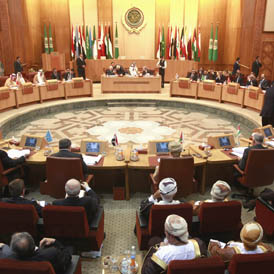Syria’s Assad defiant despite resignation call
As the King of Jordan says President Assad should step down and Syria is suspended from the Arab League, analysts tell Channel 4 News Syria’s growing isolation may be “a decisive blow” to the regime.
The King of Jordan, a country which borders Syria, has called on President Assad to step down and talk with the opposition to begin an orderly transition in Syria.
King Abdullah of Jordan told the BBC that, if he were in Mr Assad’s position, he would make sure “whoever comes behind me has the ability to change the status quo.”
He added: “If Bashar has the interest of his country, he would step down, but he wuold also create an ability to reach out and start a new phase of Syrian political life.”
If Bashar has the interest of his country, he would step down. King Abdullah of Jordan
King Abdullah is the first Arab leader to openly say Mr Assad should step down, and his comments follow the Arab League’s decision at the weekend to suspend Syria.
Syria’s foreign minister has condemned the Arab League’s decision to suspend the country.
“The suspension of the Arab League membership is illegal,” Walid al-Muallem told a press conference in Damascus on Monday.
“The Arab League said it worked for stopping the violence in Syria and said the US is not a member of the Arab League… but they are an unofficial member,” he continued.
Mr al-Muallem said that Syria has abided by the terms of an Arab League peace deal and called for an emergency Arab summit to discuss the suspension. The deal, struck on 2 November, called on Syria to stop violence against demonstrators, release political prisoners, and start a dialogue with the opposition.
But in the two weeks since the deal, activists and human rights groups say violence has not stopped against civilians. They estimate over 150 people have been killed by government forces across the country since then.

Embassies attacked
Eighteen member states of the Arab League – which is chaired by Qatar – voted on Saturday to suspend of Syria and push ahead with political and economic sanctions. Syria, Lebanon and Yemen voted against the move, whilst Iraq abstained.
The vote triggered raids by people reported to be government supporters on the Qatari and Saudi embassies in Damascus on Saturday, and at the Turkish embassy and consulates on Sunday.
“As for attacks on foreign embassies, as the foreign minister I apologise for these aggressions,” Mr al-Wuallem said.
Read more: Syria 'spilling over into sectarian violence'
Neighbours increase criticism
In response to the embassy attacks, Turkey toughened its rhetoric, saying it would take a “resolute stance” against its neighbour and former ally.
Ahmet Davutoglu, Turkey’s foreign minister, told the Turkish parliament on Monday it was no longer possible to trust Assad’s government.
“We will take the most resolute stance against these attacks and we will stand by the Syrian people’s rightful struggle,” he said.
Meanwhile, the EU have extended economic sanctions against Syria and said it was working “closely” with the Arab League.
Libya ‘will not be repeated’
The Arab League has stopped short of expelling Syria and has not explicitly called for a UN Security Council resolution backing a “no-fly” zone in the country.
The Syrian government on Monday said it was confident Russia and China, which abstained on the Libya UN vote, would continue to block western efforts at the United Nations to condemn its crackdown on protesters.
“The Libya scenario will not be repeated,” Mr al-Muallam said.
The decision could be a decisive blow because of the leverage this action will give at the UN. Dr Wafik Moustafa
But Dr Wafik Moustafa, director of the Conservative Arab Network think tank, told Channel 4 News he believes the Arab League’s decision will eventually pave the way for more decisive action at the UN, as was the case with Libya.
“In some ways the Arab League is irrelevant, but its stand is very important in terms of international diplomacy,” Dr Moustafa said.
“The decision could be a decisive blow because of the leverage this action will give at the UN. Syria’s relationship with Russia and China is not set in stone – it is historical power politics,” Dr Moustafa continued.
Read more: After Gaddafi, where next for the Arab Spring?
Russia in a ‘difficult position’
Alex Nice, coordinator of the Russian and Eurasian programme at Chatham House, agreed that the Arab League decision puts Russia in a “very difficult position.”
“There is a political and economic relationship [between Russia and Syria], and ultimately Russia will do a cost benefit analysis,” Mr Nice told Channel 4 News.
“Russia doesn’t want to be isolated, it doesn’t want to be seen to be propping up a pariah, but its also worried by the precedent intervention sets. But, personally speaking, I think it’s unlikely Russia will sacrifice its broader relationship with the international community to protect Syria,” he continued.
He added that Russia is likely to coordinate its stance with China, both of whom will consider their relationships with Iran – Syria’s strongest ally in the region – when doing so.
-
Latest news
-
Ex-Trump lawyer Michael Cohen testifies at hush money trial3m

-
Racial hate speech laws being ‘weaponised’ warns National Black Police Association7m

-
‘Hard to believe so many women going through such horrors’, says woman whose baby daughter was stillborn8m

-
Damning report condemns ‘shockingly poor’ UK maternity services12m

-
People ‘expecting the West to stand by Georgia’, says opposition party leader5m

-





